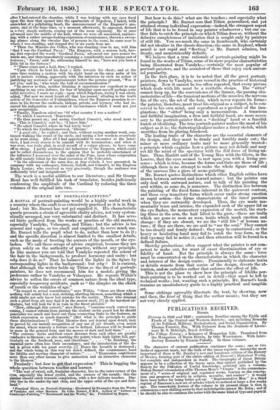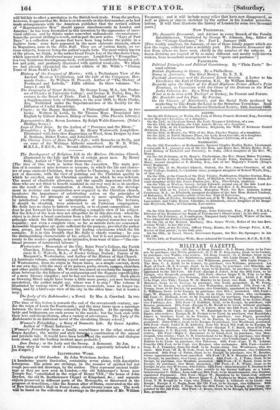PUBLICATIONS RECEIVED.
Boors.
Norway in 1848 and 1849; containing Rambles among the Fields and: Fjords of the Central and Western districts; and including Remarks on its Political, Military, Ecclesiastical, and Social Organization. By Thomas Forester, Esq. With Extracts from the Journals of Lieute- nant M. S. Biddulph, Royal Artillery. The Village Notary ; a Romance of Hungarian Life. Translated from the Hungarian of Baron Eitros, by Otto Wenckstern. With Intro- ductory Remarks by Francis Pulszky. In three volumes.
The character of current publication continues the same; one or two books of apparent mark, but the bulk of the issues reprints. Among the moat important of these is Mr. Bentley's new and handsome edition of the History of Mexico, forming part of the entire edition of Prescott's Historical Works, but complete and independent in itself. The Geography of Great Britain appears to be a collection of the tracts upon that subject published by filet Society for the Diffusion of Useful Knowledge, collected into a volume.. Bishop Burnet's translation of Sir Thomas More's " Utopia " is the commence- ment of a " series of original and reprinted works, bearing on the renova- tion and progress of society in religion, morality, and science" : it would have been better for being better got-up. "Representative Men" is a third reprint of Emerson's new set of articles which we noticed at large a few weeks ago. The remarkable feature of the volume in its present shape is that it commences a new shilling series by that indefatigable caterer Mr. Bohn ; and if he should be able to continue the series with the same kind of type and paperit will bid fair to effect a revolution in the British bOok trade. From the preface, however, it appears that Mr. Bohn is on his mettle in this first number, as he had made arrangements with the American publisher that the revised edition of "Representative Men" should appear simultaneously in London and America : he has been forestalled in this intention by the appearance of =re- vised editions, and he thinks under somewhat unhandsome circumstances : hence the present shilling's-worth, and in part the new series. "Lays of Past Days" is a collection of poems that have been long before the public in a ffuiig�iitive form : some have appeared in the more elaborate Annuals, others in Magazines, some in the John Bull. They are of various kinds, on va- rious subjects, humour being the author's main forte. The most widely known of the pieces, we think, is the rather broad Tragic Lay of the One-horse Chay, which appeared in Blackwood many years ago. Longfellow's "Evangeline'; is a very handsome drawingroom-book, well printed, beautifully bound in yel- low and gold, and profusely illustrated with spirited wood-cuts. We think we had already chronicled the second edition of Mr. Wilde's "Closing Tears of Dean Swift's Life."
History of the Conquest of Mexico; with a Preliminary View of the Ancient Mexican Civilization, and the Life of the Conqueror, Her- nando Cortes. By William H. Prescott, Author of "The History of Ferdinand and Isabella." Fifth edition. In three volumes. Vo- lumes I. and II.
The Geography of Great Britain. By George Long, M.A., late Profes-
sor of Classics at University College - and George R. Porter, Esq., Se- cretary to the Board of Trade. Part I. England and Wales. With a Supplementary body of Statistics, to the year 1850, by Hyde Clarke, EEssqq Published under the Superintendence of the Society for the 'on of Useful Knowledge.
Utopia; or the Happy Republic. A Philosophical Romance, in two books. Written in Latin, by Sir Thomas More. Translated into English by Gilbert Burnet, Bishop of Sarum. (The Phcenix Library.) Bepreeentative Men. Seven Lectures. By Ralph Waldo Emerson. (Bohn's lling Series.) Lays of Past Days. By the Author of " Provence and the Rhone." Evangeline; a Tale of Aeadie. By Henry Wadsworth Longfellow.
Illustrated with forty-five Engravings on Wood, from Designs by Jane E. Benham, Birket Foster, and John Gilbert.
The Closing Years of Dean Swift's ; with Remarks on Stella, and on some of his Writings hitherto unnoticed. By W. It Wilde,
M.R.I.A., F.R.C.S., &c. Second edition, revised and enlarged.
The Development of Religious Life in the Modern Christian Church, illustrated by the Life and Work of certain great men. By Henry Solly, Author of "The Great Atonement," &c.
[The idea of this work is better than the execution. The main por- tion of it consists of nine lectures or sermons, in which the life and charac- ter of some eminent Christian, from Luther to Charming, is made the sub- ject of discourse, with the view of pointing out the Christian quality in which he excelled, and the Christian qualities in which he was deficient. The moral of charitable allowance, and the equally important truth that those who are not fitted to benefit mankind in one way may do so in another, are the result of the examination. A closing lecture, on the develop- ment in doctrine and organization now required in the Christian church, inculcates the importance of substituting action on the principles of Christian love, for *tempts at conversion to mere opinions, whether by intellectual exertion or subscriptions of money. The lectures, it- should be observed, were addressed to an Unitarian congregation. Solly lays no claim to historic research, or to elegant composition; nor does he put forward his lectures as affording a complete view of his subject. But the defect of the book does not altogether lie in this direction : when the object is to draw a broad conclusion from a life—to exhibit, as it were, the principle which the life illustrates—new facts or original researches are not requisite ; nor even a complete view, so far as minute facts are concerned. Accessible biographies are quite sufficient for the purpose, provided the author sees, grasps, and broadly Impresses the leading conclusions which the life contains. It is in this breadth that Mr. Solly is chiefly wanting : he sees the distinguishing characteristic of his subject, but it is not presented vigo- rously to the reader—perhaps, as he intimates, from want of time—" the con- tinual pressure of mimstirial labours."]
_ Westminster : Memorials of the City, Saint Peter's College, the Parish
Churches, Palaces, Streets, and Worthies. By the Reverend Mack- enzie E. C. Walcott, M.A., of Exeter College, Oxford ; Curate of St.
Margaret's, Westminster, and Author of the History of that Church. [A handsome volume, containing a good and agreeable account of the history of Westminster, from its origin in Saxon times, as a simple convent, down to our own day., with the story of its palaces, parks, streets, squares, churches, and other public buildings. Mr. Walcott has aimed at reaching thehappy me- dium between the dry fulness of an antiquarian and the ffippant superficiality of a more literary compiler; and he has not been unsuccessful. Such places as Downing Street might have borne a little more gossip ;et once becoming' aneodotical, the author might say, where was I to stop ? The volume Is illustrated by various views of Westminster memorials, some no longer ex- Brian& and by a bird's-eye view of the city in the olden time but it wants a map.] The Lady of the Bedchamber; a Novel. By Mrs. A. Crawford. In two volumes.
[The time of this fiction is towards the end of the seventeenth century, un- der the reign of Louis the Fourteenth • and the story turns upon a marriage the hero and heroine ordered by the Monarch. At the opening the
bride and bridegroom are each averse to the match; but the book ends with their love and reconciliation, after a variety of adventures. The Lady of the Bedchamber is an historical novel of the circulating library school.] : Woman's Priendskip ; a Story of Domestic Life. By Grace Aguilar,
Author of " liamelnfinence."
Woman's Friendship-11ms a family resemblance to the other stories of (trace Aguilar ; the matter and style fo' g a combination of the annual
and juvenile tale. It.wm beild have been the narrative and dialogue been closer, and the leading incident more probable.]
Dan Daisy; or the Lady and the Sweep. A Romaunt. By Jon.
[A long story in verse about a chimney-sweep; apparently intended for a 3eu d'esprit.] ItLusaitaaato Wonsc.
Vestiges of Old London. By John Wykeham Archer. Part L [A handsome quarto faseiculus, containing seven plates, with descriptive letterpress. The prints are etchings, in the manner of spirited but not rough pen-and-ink drawings, by the author. They represent ancient build- ings as they are now seen in London,—the old fishmonger's house near Temple Bar, "established in the reign of Henry V111.," the house of John Dryden, the old St. Bartholomew Chapel at Kingsland, &c. and separate objects preserved in different parts of the Metropolis, or discovered m the progress of demolition,--like the Roman altar of Diana, excavated on the site of New Goldsmith's Hall in Foster Lrum, about twenty years ago. The work will be based on the collection of drawings in the possession of Mr. William
Twopenny ; and it will include many relics that have now disappeared, as well as places or objects sketched by the author in his London perambu- lations. It will thus illustrate the history of London for some two thousand years.]
NEW PERIODICAL.
The Domestic Economist, and Adviser in every Branch of the Family Establishment. Conducted by George W. Johnson Esq., Editor of the " Cottage Gardener," &c. Part I. January 1850. [Five weekly numbers, for January, of one of those family papers which are now the vogue, collected into a monthly part. The Domestic Economist dif- fers from others we have seen, chiefly in the number of the subjects. A dozen divisions are treated of by as many different and mostly Well-laiown writers, from household management to our "sports and pastimes."]
PAsnitrimrs.
Political Principles and Political Consistency. By " Plain Facts." Se- cond edition.
British Diplomacy in Greece. By a Philhellene. Steam to Australia. The Rival Routes. By X. X. X. Freehold Assurance and the Farmers' Estate Society. -A Letter to his Excellency the Earl of Clarendon, K.G. By William Bridges. Remarks upon the Object of his Royal Highness Prince Albert's Prize Treatises, in Connexion with the Cause of the Distress in the West India Colonies, &e. By a West Indian. What is to be done with Turkey? or Turkey, its Present and Future. Mr. Huxtable and his Pigs. By Porcius. On the Climate of Manchester, and the Social Evils produced by neglecting to Tile-Drain the Land in the Suburban Townships. Heat} at a meeting of the Manchester Statistical Society, 24th January1850,



























 Previous page
Previous page